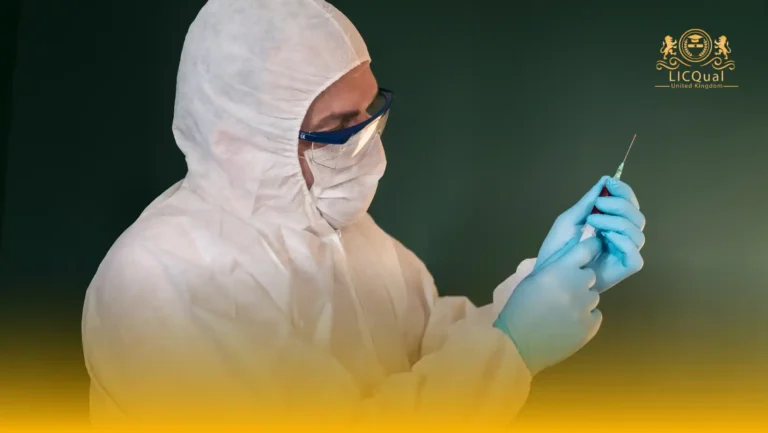The LICQual Level 3 Certificate in Tropical Medicine (Cert TM) is a globally recognized qualification designed for healthcare professionals, students, and practitioners who want to build expertise in the prevention, diagnosis, and management of tropical diseases. This Level 3 Tropical Medicine course provides a strong foundation in understanding infectious and vector-borne diseases such as malaria, dengue, and parasitic infections—conditions that continue to challenge healthcare systems worldwide.
Tropical medicine is a vital field for anyone working in global health, public health, or clinical practice. With the rise of international travel, climate change, and emerging infectious diseases, the demand for professionals trained in tropical medicine has never been greater. This accredited Tropical Medicine qualification equips learners with both theoretical knowledge and practical insights, ensuring they can apply their skills in hospitals, community health programs, and international healthcare projects.
The LICQual Tropical Medicine Certificate (Level 3) is structured to be flexible and approachable, making it suitable for busy professionals as well as students preparing for advanced studies. The course covers essential topics such as tropical disease epidemiology, diagnostic methods, treatment strategies, and public health interventions.
What sets this qualification apart is its emphasis on real-world application. Learners not only study the science of tropical medicine but also develop the ability to recognize symptoms, understand diagnostic tools, and support prevention strategies in diverse healthcare settings. This makes the Level 3 Certificate in Tropical Medicine a valuable stepping stone for careers in hospitals, NGOs, research institutions, and international health organizations.
If you are ready to advance your healthcare career with the LICQual Level 3 Certificate in Tropical Medicine (Cert TM), this program offers the perfect balance of academic rigor, professional recognition, and global career impact.
Course Overview
Qualification Title
LICQual Level 3 Certificate in Tropical Medicine (Cert TM)
Total Units
6
Total Credits
24
GLH
120
Qualification #
LICQ2200843
Qualification Specification
To enroll in the LICQual Level 3 Certificate in Tropical Medicine (Cert TM), applicants must meet the following criteria:
|
Qualification# |
Unit Title |
Credits |
GLH |
|---|---|---|---|
|
LICQ2200843-1 |
Introduction to Tropical Medicine and Global Health |
4 |
20 |
|
LICQ2200843-2 |
Parasitic Infections and Prevention |
4 |
20 |
|
LICQ2200843-3 |
Bacterial and Viral Tropical Diseases |
4 |
20 |
|
LICQ2200843-4 |
Travel Medicine and Risk Assessment |
4 |
20 |
|
LICQ2200843-5 |
Tropical Disease Diagnosis and Laboratory Techniques |
4 |
20 |
|
LICQ2200843-6 |
Professional Practice, Ethics, and Continuing Professional Development (CPD) |
4 |
20 |
By the end of this course, learners will be able to:
Unit 1: Introduction to Tropical Medicine and Global Health
By the end of this unit, learners will be able to:
- Explain the scope and significance of tropical medicine in global healthcare.
- Analyse epidemiology and disease patterns in tropical regions.
- Evaluate the impact of environmental, socio-economic, and climate factors on tropical diseases.
- Assess international public health strategies and initiatives for disease prevention and control.
Unit 2: Parasitic Infections and Prevention
By the end of this unit, learners will be able to:
- Identify and classify major parasitic diseases affecting tropical regions.
- Describe transmission pathways, life cycles, and risk factors of parasitic infections.
- Recommend preventive measures, including vector control, hygiene, and vaccination programs.
- Apply appropriate diagnostic and treatment strategies for parasitic infections.
Unit 3: Bacterial and Viral Tropical Diseases
By the end of this unit, learners will be able to:
- Explain the pathology, symptoms, and transmission of key bacterial and viral tropical diseases.
- Evaluate treatment protocols, antimicrobial use, and resistance issues.
- Implement preventive strategies including hygiene, sanitation, and vaccination.
- Integrate knowledge of disease management into clinical decision-making.
Unit 4: Travel Medicine and Risk Assessment
By the end of this unit, learners will be able to:
- Conduct risk assessments for individuals travelling to tropical regions.
- Provide pre-travel health advice, including vaccinations and prophylaxis.
- Develop strategies for the prevention and management of travel-related illnesses.
- Demonstrate knowledge of emergency planning and safety measures for travellers.
Unit 5: Tropical Disease Diagnosis and Laboratory Techniques
By the end of this unit, learners will be able to:
- Describe laboratory techniques used in diagnosing tropical diseases.
- Conduct accurate sample collection, handling, and analysis.
- Interpret diagnostic results to support clinical decision-making.
- Integrate laboratory findings into patient management and treatment planning.
Unit 6: Professional Practice, Ethics, and Continuing Professional Development (CPD)
By the end of this unit, learners will be able to:
- Demonstrate professional and ethical responsibilities in tropical medicine practice.
- Communicate effectively with patients, colleagues, and multidisciplinary teams.
- Apply critical thinking and reflective practice to case studies in tropical medicine.
- Plan and engage in Continuing Professional Development (CPD) to maintain knowledge and professional competence.
The LICQual Level 3 Certificate in Tropical Medicine (Cert TM) is designed for healthcare professionals, students, and practitioners who want to strengthen their expertise in tropical diseases, infectious disease management, and global health. This Level 3 Tropical Medicine qualification is ideal for those seeking CPD accreditation, career advancement, or a pathway into specialized healthcare roles. Whether you are already working in clinical practice, public health, or planning to enter the healthcare sector, this course provides the skills, recognition, and confidence to excel.
1. Healthcare Professionals in Clinical Practice
- Doctors and nurses aiming to expand knowledge of tropical diseases
- Allied health staff supporting patients in high-risk regions
- Clinicians seeking CPD-accredited tropical medicine training
- Professionals working in hospitals and diagnostic centers
- Staff preparing for roles in infectious disease management
2. Laboratory and Diagnostic Staff
- Laboratory technicians handling tropical disease specimens
- Assistants seeking structured training in parasitology and virology
- Professionals aiming to improve diagnostic accuracy in tropical medicine
- Staff preparing for supervisory or advanced laboratory roles
- Technicians aligning with international healthcare standards
3. Medical and Healthcare Students
- Students pursuing medicine, nursing, or biomedical sciences
- Learners preparing for postgraduate studies in global health
- Graduates seeking a recognized Level 3 tropical medicine qualification
- Students interested in infectious disease prevention and control
- Individuals bridging academic knowledge with practical healthcare skills
4. Public Health and Community Healthcare Workers
- Professionals working in disease prevention and health outreach
- Staff supporting malaria, dengue, and parasitic disease programs
- Workers in rural or underserved healthcare systems
- Public health officers seeking CPD-recognized tropical medicine training
- Community healthcare providers expanding diagnostic knowledge
5. International Healthcare Professionals
- Overseas medical staff seeking UK-recognized tropical medicine qualifications
- Professionals aiming to meet global healthcare and NGO standards
- Migrant healthcare workers preparing for international career opportunities
- Staff needing formal certification for regulatory compliance
- Learners looking for flexible, accessible online tropical medicine training
6. Career Changers Entering Healthcare
- Professionals from science or biology backgrounds transitioning into healthcare
- Individuals seeking structured entry into tropical medicine and global health
- Career changers aiming for stable, in-demand healthcare roles
- Learners motivated by long-term career security in medical fields
- Adults seeking accredited qualifications for professional credibility
7. Research and Academic Professionals
- Researchers exploring tropical and infectious diseases
- Academic staff supporting healthcare and global health programs
- Professionals contributing to tropical medicine research projects
- Educators seeking CPD in infectious disease and epidemiology
- Scholars aiming to expand expertise in applied tropical medicine
To ensure the highest quality of training and learner success, centres delivering the LICQual Level 3 Certificate in Tropical Medicine must meet the following requirements:
- Qualified and Competent Staff: Centres must employ experienced tutors and healthcare professionals who are fully qualified in tropical medicine or related healthcare fields. Staff should be capable of delivering theory and practical components to international standards.
- Comprehensive Learning Resources: Centres must provide learners with access to up-to-date textbooks, reference materials, case studies, and digital resources that support effective learning.
- Practical Training Facilities: Centres should be equipped with adequate laboratory facilities, diagnostic tools, and simulation equipment to allow learners to practice essential tropical medicine techniques safely and effectively.
- Assessment and Support Systems: Centres must implement robust assessment methods, including practical evaluations and written assignments, along with learner support mechanisms such as mentoring, feedback, and guidance throughout the course.
- Health and Safety Compliance: Centres must maintain safe, clean, and well-organized learning environments that comply with local health and safety regulations.
- CPD and Professional Development Opportunities: Centres should encourage and facilitate Continuing Professional Development (CPD) activities, enabling learners to maintain and enhance their professional competence.
- Access to Digital and Online Learning Tools: Centres should provide learners with reliable access to online platforms, virtual simulations, and supplementary e-learning resources where applicable.
By meeting these standards, centres ensure that learners receive high-quality, professional training that prepares them for successful careers in tropical medicine and related healthcare fields.
Assessment and Verification
All units within this qualification are subject to internal assessment by the approved centre and external verification by LICQual. The qualification follows a criterion-referenced assessment approach, ensuring that learners meet all specified learning outcomes.
To achieve a ‘Pass’ in any unit, learners must provide valid, sufficient, and authentic evidence demonstrating their attainment of all learning outcomes and compliance with the prescribed assessment criteria. The Assessor is responsible for evaluating the evidence and determining whether the learner has successfully met the required standards.
Assessors must maintain a clear and comprehensive audit trail, documenting the basis for their assessment decisions to ensure transparency, consistency, and compliance with quality assurance requirements.







